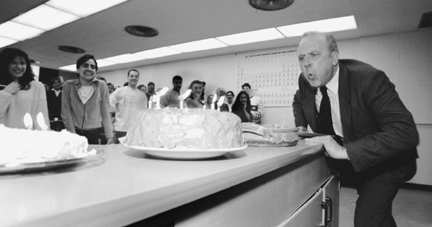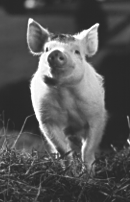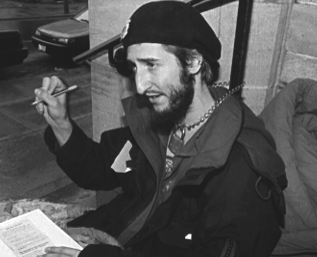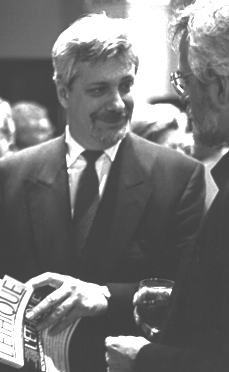


Photo by Owen Egan
There were a number of demonstrations on campus during the last week, but this one was a little different. Students in Professor John Shingler's South African Politics course wanted to demonstrate their affection and respect for the political science teacher, who is retiring after 29 years at McGill. There was cake, champagne, and a farewell gift of a case of his favourite beer. Considering Shingler's field, it was appropriate that the tribute was described by one of his students as a "grassroots effort."

Photo courtesy Universal Pictures
As much as any mother loves her children, having a demanding and noisy pack of kids demanding food and attention at all hours would be a sure recipe for burnout. Even a devoted mom needs to get away for some private time now and then. That's not being piggish unless, well, unless the mother is a pig.
Ed Pajor, a PhD candidate in the Department of Biology, just might have an answer for sows who weary of the constant pressures of mothering their piglets. Pajor, who's pursuing his work at the Centre for Food and Animal Research in Ottawa, has come up with a system employing side-by-side pens for sows--one where she can take care of her offspring and one she can escape to for the occasional respite. The pens are separated by a small gate that the sow--but not the piglets--can step over.
The idea is that a happy pig family is a productive pig family.
Overtired sows take longer to recuperate and produce more litters. And when a sow has the chance to sneak away for a break now and then, the weaning process becomes more gradual and less traumatic for the piglets.
"When the weaning is too abrupt, sometimes there is a decrease in the growth rate of the piglets and they can become ill," says Pajor, who feels his system is a little more humane for both sows and their offspring.
After all, not every piglet will be as fortunate as the youngster in Babe, adopted by a family of border collies following a sudden separation from his mother.
So far, Pajor's idea looks promising. The sows and piglets appear to be happier and the pork producers who are supporting his research are pleased. "It seems to be a win-win-win situation," notes Pajor.

Photo by Jack Sullivan
A number of students have been voicing concerns over the future of the Faculty of Religious Studies. While religious studies is unlikely to disappear, some administrators wonder if the faculty might be better suited to departmental status. Political science student Lars Rosenblum decided to express his concern in a particularly visible way last week, chaining his neck to a railing outside the Birks Building. Asked by the Reporter how long he intended to maintain his vigil, Rosenblum stoutly asserted, "As long as it takes." But in quintessentially Canadian fashion, he tempered his reply, opting for pragmatism over passion. "Of course the building closes at five, so that's when I'll leave."
Photo Daniel McCabe

What is it about former premiers and universities? It sometimes seems that as soon as the keys to the old government limousines are turned in, a retired premier's first order of business is to shop around for a university to teach at.
Mike Harcourt is the most recent examplehe'll be joining the University of British Columbia as an adjunct professor this summer. Bob Rae is teaching a seminar on industrial relations at the University of Toronto, Robert Bourassa lectures at Université de Montréal, David Peterson is a fellow at York's McLaughlin College and Dave Barrett is a member of Simon Fraser's political science department.
"I think there are several reasons why universities are attractive to people leaving the premiership," says Pierre-Marc Johnson, a law professor at McGill and a former Quebec premier.
For one thing, premiers get accustomed to having access to first-rate analyses of trends and events, says Johnson. "I seldom saw lousy briefing notes from my staff. You get used to very solid, intelligent critiques of the world around you and universities are an ideal environment for that sort of analysis as well. You don't really get that in the private sector."
Another factor is "the notion of the public good. I know many people are suspicious of politicians, but most politicians believe that they are serving the public purpose. There is certainly more of a sense of that feeling in universities than in industry." Former premiers are also often uncomfortable with the idea of working for somebody else. "There is a certain amount of freedom associated with working at a university. If you contribute what is expected of you, people don't get on your back. As a premier, you're used to calling the shots. In the private sector, someone calls the shots for you."
In addition, universities also keep onetime premiers "intellectually fit." You're always being challenged by your students, as you were once constantly being challenged by the media and the opposition.
"I don't know if any of us consider ourselves to be true academics," says Johnson. "We're generally involved in other activities as well. I have great respect for people who devote their lives to scholarship and I feel privileged to have access to this milieu." The universities benefit from the arrangement too, he says. "One contribution we make to universities is tied to our experience. In my environmental policy course, I teach my students how laws are made -- I give them an insider's perspective that I don't think you could really find in any textbook."